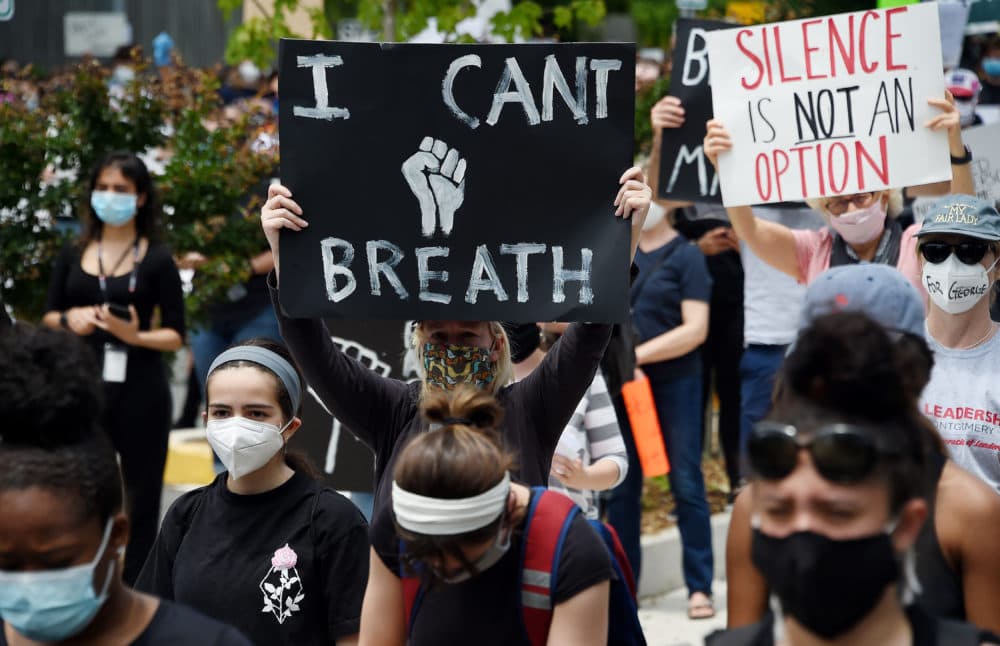Advertisement
Commentary
White Friends, Now Is The Time For Empathy

As a Black person in America, I am frustrated, I am burned out, I am saddened and I am confused.
When we have barely recovered from the tragedy of one slaying, another occurs. It’s a tune that keeps playing out, as if it to some sick conductor of an eerie ensemble. Here’s another alarming sound: the piercing silence by white friends. It’s loud and unmistakable.
I get it. You see, I wasn’t always a minority.
I was a bright-eyed, bushy-tailed 15-year-old when I started college in the U.S. I learned about the complicated nature of race relations when I arrived here, part of a sort of “soft curriculum,” as I navigated making friends and finding my social footing on campus.
I learned about the N-word, and was shocked to learn how other people used it systematically against another group of people. And I got a rude awakening from a friend in my dorm, an African-American woman. She gave me a good schooling about American history, including the part about when her grandmother got called the N-word when she was growing up. Just imagine the pleasantries you heard sitting at your grandmother’s feet — and in place of those, insert harrowing tales of how she and her siblings, cousins, friends and church members had been targeted, dehumanized, and killed off, just because they were Black.
My eyes were wide open.
It’s easier, almost natural, to turn a blind eye to issues that don’t affect your own personal day to day, particularly when they generate negative emotions. Our psychological makeup actually favors that, and it includes denial and repression as common defense mechanisms for stressful events.
Here’s another alarming sound: the piercing silence by white friends. It’s loud and unmistakable.
I lived nearly half my life mostly oblivious to the realities of racism, as part of the racial majority in Kenya. (I was born in the U.S., but all of my formative years were spent abroad.) In Kenya, the racial demographic is Black, with a drop of color added in.
It was pretty standard to have a southeast Asian kid or two in my class, maybe one white kid, and a few others dotted throughout school. We saw some diversity at restaurants and malls, too, but that was about it. As a child, I never once questioned whether or not my voice was being heard because of, or in spite of, the color of my skin.
Returning to the U.S. was a wake up call. Privilege, and the lack thereof, slapped me hard in the face. Having a voice, and knowing where it counted and when it counted became apparent. The color by which this voice would be evaluated — pun intended — took on a new meaning.
I shouldn’t have been surprised when I got stopped and searched at a mall department store at 16-years-old, because the customer service agent thought my sister, my friend and I — all Black — looked suspicious. I was a bit more prepared by the time I was a medical resident, when I was verbally abused during a lovely dinner with my residency training mates by some white men at the restaurant who felt it was their right to disrupt our group.
Advertisement
My eyes are wide open.
Some might say that the deaths of George Floyd or Sandra Bland are just anecdotal, one-offs that are simply sensationalized by the media. But that’s not the case. A plethora of research and reporting discounts this notion. A 2014 investigation by ProPublica demonstrated that Black teenagers are between 10 and 40 times more likely at being killed by a police officer, as compared to their white counterparts. (And white officers are responsible for 68% of these deaths.) Study after study has determined that systemic bias among police disproportionately affects Blacks. And Black men and boys face the highest lifetime risk of all.
Victim blaming also forms the basis of a common argument circulating in our ether -- that the fates of Black men and boys, at the hands of police, is somehow deserved. Attribution errors are no new phenomenon: we are more likely to attribute blame to those that are different from us. But this, too, is wrong. The Black Americans who have died at the hands of police in recent days were acting just like anybody else: they were in their own homes taking care of a young child, out for a jog, making a traffic turn.
Why are so many of my white friends silent? Is it because they don't know what to say, or because it truly simply is not a priority?
The evidence is so abundant and so clear. So why hasn’t white America made addressing this their priority? Why are so many of my white friends silent? Is it because they don't know what to say, or because it truly simply is not a priority?
In Kenya, I was part of the majority. I knew then — and now — the importance of standing with a smaller, less audible, more disparate, often more easily drowned out voice.
Allies matter. If you’re wondering if there’s a right way to show empathy, there isn’t. But one thing I can assure you is that not demonstrating any, will accomplish nothing.
For starters, sit down with someone. Ask with outstretched arms, how I can help? Listen. Check in on your colleague or friend who is a person of color, just to see how they’re doing. Be open to exploring and understanding the hurt and anger they may be feeling. Ask your employer to create a safe space, where people can talk about their emotions and have constructive conversations about supporting one another. If you are the boss, step in and do it yourself. Stand up in the spaces you occupy — whether at work or among friends — and speak out against any comments or actions that perpetuate racial stereotypes and prejudiced actions.
These simple, human actions have the real potential to make positive change.
The recent Memorial Day reminds us of the old soldier adage, no man left behind. America, men are falling. Don’t leave them behind.
